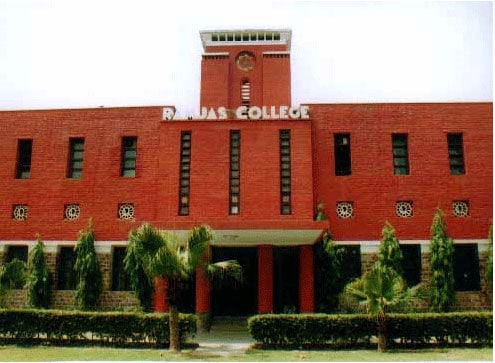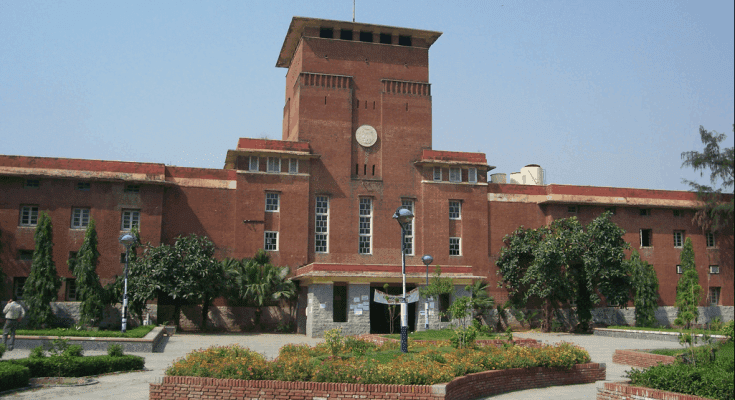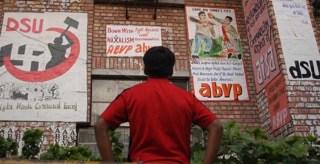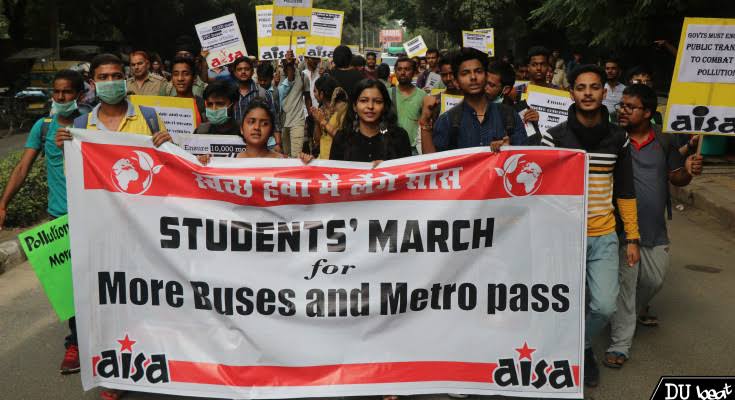Student activists of the All India Students’ Association (AISA), a student organisation affiliated with the Communist Party of India (Marxist-Leninist) Liberation, alleged that they were detained when the Prime Minister visited the University on Friday. In an exclusive conversation with AISA Delhi President Abhigyan, DU Beat discovered how the events transpired on June 30.
On June 30, Prime Minister Narendra Modi visited Delhi University as the Chief Guest for the closing ceremony of the University’s centenary celebrations. As celebrations were in full swing, a few kilometres away, Abhigyan and Anjali, student activists of the All India Students Association (AISA), were allegedly detained inside their homes without any warrant or notice.
At around 8 a.m. on the day of the ceremony, AISA Delhi University President Abhigyan Gandhi was reportedly running a few errands when he received word that 5–6 police personnel were looking for him in Vijay Nagar. By 9.30, they had arrived at his locality and demanded that he either go with them to the Model Town Police Station or be placed under house arrest and have his movements monitored for the next four to five hours. Anjali Sharma, the AISA DU Secretary, was also placed under house arrest. Reportedly, the police warned them that they were in a “circle of suspicion” and were under surveillance in order to stop any “protests or dissents from violating the discipline within the University.”
Citing the PM’s visit as a reason, I and AISA DU Secretary Anjali have been held in detention in our flat and are not allowed to go on campus.
– Abhigyan, AISA Delhi President
Abhigyan asserted that the police were present in their flat from 9:30 a.m. to 1.30 p.m., during the entirety of PM Modi’s presence at the University for the closing ceremony. He claimed that when the police placed him under house arrest, neither a warrant nor an order were displayed. Following the 4-hour detention, a letter bearing the signatures of AISA functionaries was sent to the Sub Divisional Magistrate of Delhi (SDM) questioning the “illegal detention” of the student activists and stating that it was “a breach of personal space”. However, the Model Town Police Station house officer, Lalit Kumar, reportedly denied all allegations made by the activists.


(Image Credits: Twitter account of Anjali, Secretary of AISA DU (@anjali1_27))
In conversation with DU Beat, the student activists revealed the entire situation through their lenses.
On being informed of the PM’s visit to the University, AISA DU had put up ‘Modi is coming to our campus!’ posters on the walls of North Campus, demanding accountability on behalf of the students. These posters posed relevant questions to the PM regarding the consistent fee hike, the rise in the unemployment rate to 8.1%, and the deletion of the chapters on Ambedkar and Gandhi from the curriculum. Allegedly, these posters were stripped off by the administration and members of the Akhil Bharatiya Vidyarthi Parishad (ABVP) soon enough.
Primarily, I feel that the Prime Minister should have taken questions. Instead of having a crowd which claps when the teacher directs them to or instead of turning the campus into a cantonment ; he should have had a genuine engagement with the students. What ‘safety’ of the Prime Minister is being threatened and by whom?
– Abhigyan, AISA Delhi President

(Image Credits: AISA DU on Instagram (@aisa_du))
He also discussed the “FYUP KA REPORT CARD” campaign that AISA had launched in response to students’ disapproval regarding the implementation of the New Education Policy (NEP) 2020 as well as the recruitment and ad-hoc crises that have repeatedly rocked the University.
We were trying to convey how the students should have their say in the policymaking on education. Yet, this is something the PM does not seem interested in. What he does seem interested in is ignoring the real questions of students, teachers and stakeholders. It is unfortunate how many respectable teachers have been lost by the University because of the hijacking of the appointment scheme by RSS and BJP.
As students across the University continue to express dissent over the hurried implementation of NEP, considering it a failure, the AISA Delhi President discussed the concerns and burdens of the policy for freshers and how the student organisation is actively trying to reclaim democratic discussion spaces within the University.
The way the students of DU are suffering right now, the way they are making their assignments, the way they are forced to study courses like Fit India and Swachh Bharat, is something that should concern all of us. Every student should feel the anger that the Prime Minister can come, simply ignore us by detaining those raising their voices, and leave without addressing anything pertinent. We are finding ways to bring back the democratic culture of dissent and debate within the University.
Highlighting the disturbing behaviour of Delhi Police in educational spaces, he further questioned the entire culture and definition of what a university stands for.
The way the Government, the administration and the Delhi Police is acting in our universities like DU, JNU and Jamia is highly terrifying. For the last 3 years, they have turned Jamia into a cantonment- any form of student movement or student gathering has become impossible. Detaining people without a notice or a warrant, by simply stating that you are in a list of people under a ‘circle of suspicion’- what does this signify?
In conversation with DU Beat, Anjali, Secretary of AISA DU, described how their detention came as a sudden shock.
The entire thing was very surprising to us. We are also students of the University and to be treated as criminals while being accused of potentially causing ruckus and being told that the PM is “unsafe” by our mere presence was highly shocking. The questions we raised through the postering across the University were a basis for them to house arrest us. On one hand they are painting a picture that is rosy and perfect, but it is clearly covering up the work that was going on behind this- attendance equivalent to 5 classes, no black clothes, and a strict code of conduct by colleges. Be it Kamla Nagar, Mukherjee Nagar or Vijay Nagar, police were heavily stationed at all these places to protect the PM from the students- the students he was supposedly coming to meet.
They further talked about the “dual behaviour” being displayed by the University and the administration.
It was scary how they had our exact flat numbers. Comrades who called us before the arrival of the police told us how the officers were roaming in Vijay Nagar with our Facebook profiles, questioning students about us and our whereabouts. Within 5 minutes, they were at our doors. The larger question here is if we will be deprived of our spaces within the University only because of our political affiliation or just because we disagree?’
-Anjali, Secretary of AISA DU
As students across different colleges witnessed the Prime Minister on livestream, an online protest staged by the Democratic Teachers’ Front (DTF) and joined by AISA and other student organisations, displaying placards with #GoBackModi, was witnessed. Miranda House professor and Secretary of the Democratic Teachers’ Front (DTF), Abha Dev Habib, stated that the incident involving the AISA students was “highly regrettable”.

(Image Credits: AISA DU on Instagram (@aisa_du))
Featured Image Credits: Outlook India
Read also: ABVP Stages Protest at Aryabhatta College
Manvi Goel
[email protected]












